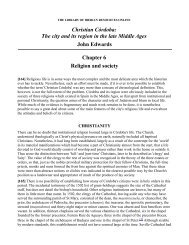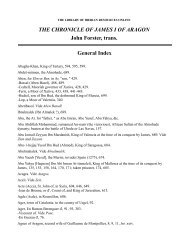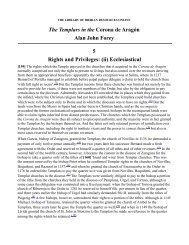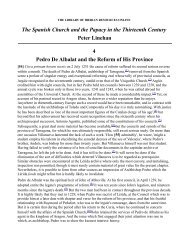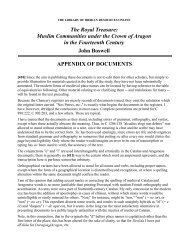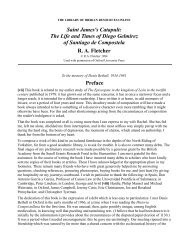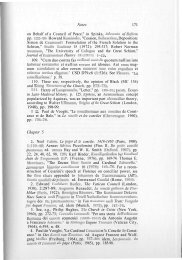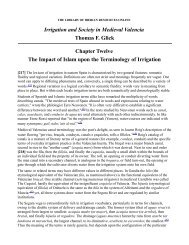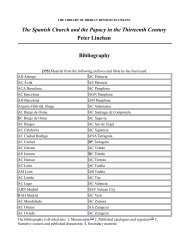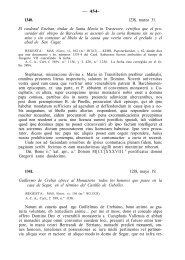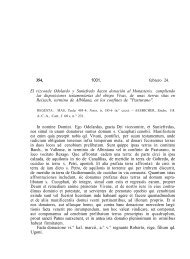PROTESTANTISM - The Library of Iberian Resources Online
PROTESTANTISM - The Library of Iberian Resources Online
PROTESTANTISM - The Library of Iberian Resources Online
Create successful ePaper yourself
Turn your PDF publications into a flip-book with our unique Google optimized e-Paper software.
order the tribunal to despatch these cases with all speed. (108)<br />
A more pleasing international episode is connected with the case <strong>of</strong> Robert Fitzwilliam, an Englishman,<br />
condemned by the Seville tribunal to ten years <strong>of</strong> galleys and perpetual prison. He was received on<br />
board, February 25, 1578 and, in November 1582, his wife Ellen presented herself in the court <strong>of</strong><br />
Madrid, with a letter from Queen Elizabeth to Philip II, representing that the poor woman had<br />
beseeched her interposition, and that the liberation <strong>of</strong> the husband would be a favor which she would be<br />
glad to reciprocate. Under any other jurisdiction, the granting <strong>of</strong> such a royal request would have been<br />
a matter <strong>of</strong> course, but the assent <strong>of</strong> the Holy Office had to be secured. <strong>The</strong> existing papers fail to<br />
inform us <strong>of</strong> the result, but that it was favorable can scarce be doubted, for the devotion <strong>of</strong> the faithful<br />
wife made a strong impression even on the hardened <strong>of</strong>ficials, whose correspondence alludes to her in<br />
terms <strong>of</strong> respect and admiration. (109) More summary was the process when, in 1572, the Barcelona<br />
tribunal sent a commissioner into French territory on some duty, and he was seized and held as a<br />
hostage for a Frenchman arrested by the tribunal, leading to an exchange <strong>of</strong> prisoners. (110)<br />
<strong>The</strong> Val d'Andorra furnished another source <strong>of</strong> international questions, for the Barcelona tribunal<br />
claimed jurisdiction over it, while Jeanne d'Albret, as Queen <strong>of</strong> Navarre, held that it was her fief. In<br />
1572, she put a French veguer there to administer justice, whereupon the inquisitors commenced to<br />
gather information about him, as a presumable Huguenot, and the Suprema ordered them to arrest him<br />
if sufficient evidence could be found, but, as the attempt was likely to prove dangerous, it need not be<br />
made unless the viceroy would furnish a sufficient guard, which apparently he declined to do. (111)<br />
All foreigners thus were objects <strong>of</strong> suspicion, and the jurisdiction <strong>of</strong> the Inquisition was stretched to the<br />
utmost to prevent their infecting the faithful. In 1572, the Suprema ordered the [461] tribunals <strong>of</strong><br />
Aragon, Catalonia and Valencia to see that no Frenchmen were employed as teachers <strong>of</strong> reading and<br />
writing anywhere within their districts, experience having shown the dangers thence arising. (112)<br />
Intercourse with foreigners was dangerous and was discouraged. In 1568, Inquisitor Moral, in reporting<br />
a visit to San Sebastian, expressed a desire to punish those who received and entertained and had<br />
particular friendship and dealings with French and English strangers, sometimes even giving them<br />
information enabling them to escape arrest, on all <strong>of</strong> which the Suprema commented by characterizing<br />
these as grave cases, which should have been sent to Logroño for trial. (113) <strong>The</strong> Spaniard, too, who<br />
went abroad was an object <strong>of</strong> suspicion, and was held to strict accountability for his acts during<br />
absence. In the Barcelona auto <strong>of</strong> June 21, 1627, there appeared a merchant <strong>of</strong> Manresa who, while in<br />
France, had listened to Huguenot preaching and had eaten flesh on Friday, for which he was penanced<br />
in a thousand ducats and was recluded in a convent for three years. (114)<br />
That, under these influences, coupled with the growing poverty <strong>of</strong> Spain and the curse <strong>of</strong> its debased<br />
currency, the number <strong>of</strong> resident foreigners diminished greatly after the opening <strong>of</strong> the seventeenth<br />
century, may be assumed from the reduction in the cases <strong>of</strong> Protestantism in the records. Those <strong>of</strong><br />
Toledo, from 1575 to 1610, show a total <strong>of</strong> forty-seven, <strong>of</strong> which the last one occurred in 1601, while<br />
those from 1648 to 1794 contain only eleven. (115) In Valladolid, the reports <strong>of</strong> twenty-nine years,<br />
between 1622 and 1662, show only eighteen cases. (116) In the Madrid tribunal, from 1703 to 1751,<br />
there is only a single case <strong>of</strong> a "Huguenot." (117) In the sixty-four autos celebrated by all the tribunals<br />
between 1721 and 1727, there are only three cases. (118) In Valencia, between 1705 and 1726, there was<br />
but a single case--a Calvinist who spontaneously denounced himself. (119) Scattering and imperfect as<br />
are these statistics, they suffice to indicate how rapidly the number [462] <strong>of</strong> foreign delinquents fell <strong>of</strong>f,<br />
after the year 1600, and that this was not the result <strong>of</strong> progress in enlightenment and toleration we shall<br />
see hereafter. It was simply that the Inquisition had succeeded in its efforts to limit intercourse between<br />
Spain and its neighbors, and to isolate it from European civilization.



